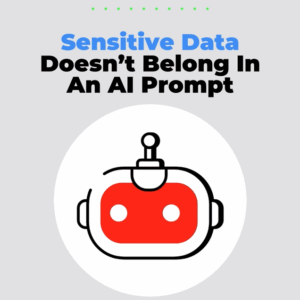Artificial Intelligence is reshaping how we work. From ChatGPT and Google Gemini to Microsoft Copilot, these tools are revolutionizing how we write, research, respond to clients—even how we 
But there’s a side to AI that’s not getting enough attention. If you’re not careful, your team could unknowingly be feeding sensitive company information straight into the hands of hackers.
Let’s break down what’s really going on—and how to stay ahead of it.
🚨 The Hidden Danger Isn’t AI—It’s Human Habits
The tech itself isn’t the villain. The problem is what employees are pasting into it. Imagine someone on your team dropping customer financials or patient records into ChatGPT to “make it sound better.” That data could be stored or used to train future models. Once it’s out, there’s no pulling it back.
It’s not just theory—it’s already happened. In 2023, Samsung engineers leaked internal code through ChatGPT. It was such a red flag, the company banned public AI tools altogether.
🧨 Enter: Prompt Injection
There’s a more sophisticated threat on the rise: prompt injection. Hackers are now planting hidden instructions in emails, documents—even YouTube captions. When your AI tool scans those materials, it can be manipulated into revealing private data or performing tasks it shouldn’t.
Bottom line? AI is being tricked into helping the attacker—without even knowing it.
💡 Why This Hits SMBs Hard
Here’s the tough truth: most small businesses aren’t watching how AI is being used internally. Employees mean well, but without policies or training, they treat AI like Google. They don’t realize what they’re pasting could be permanently stored or misused.
There’s also a gap in leadership—many SMBs haven’t yet created guidelines on safe AI use.
✅ 4 Smart Moves to Make Now
You don’t have to shut AI down. You just have to take control. Start here:
- Set Boundaries. Create a clear AI use policy. Define what tools are okay, what data is off-limits, and who to ask when in doubt.
- Educate Your Team. Show them how prompt injection works—and why sharing sensitive data in public tools is risky.
- Use Enterprise-Grade Platforms. Tools like Microsoft Copilot are built with business privacy in mind. Stick with trusted vendors.
- Monitor and Manage. Keep tabs on what tools are being used. If needed, restrict access to public AI platforms on company devices.
🛡️ Protect Your Business Before It’s Too Late
AI is powerful—but without guardrails, it becomes a liability. A few innocent keystrokes can lead to compliance violations, legal exposure, or data loss. You don’t need to fear AI—you just need to use it wisely.
Let’s talk. We’ll help you put guardrails in place and make sure your AI tools are working for you—not against you. Book your FREE AI Risk & Readiness Assessment today → https://go.appointmentcore.com/AnthonyPorch
